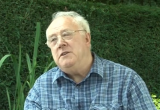
Derek Smith, directing regional Top Gear. Photo from Jim Knights, no reproduction without permission
I have much to thank Derek Smith for. He was the one who gave me my career in the BBC with the chance to join the Film Unit in Carpenter Road. It was him who took me around the world to Singapore and a story on Bishop Wilson. A wonderful story of wonderful people that matched man’s inhumanity to man, with man’s humanity. On to Malaya and a brand-new army base cut into the middle of the jungle complete with married quarters, school, swimming pools and sixty bed hospital, now to be closed by the then Wilson government and left to be devoured by the jungle. When university students were getting very bad press of their happenings during vacations we followed them and found them in Andorra working on the Forna and then on to a farm, living above the cattle in a barn high up in the Austrian mountains giving a holiday to a group of German orphans. We got bored one night and climbed halfway down to a cafe which we expected to be empty, it was packed full of people on some sort of pilgrimage already well awash on the beer and in full song. There was no escape, we were dragged in and expected to sing. My song went well. Derek let us down by singing Lilly Marlene, which was greeted with stunned silence, and he was very seriously asked where did he learn that song. Evidently it was something to do with his time in the Eighth Army, Rommel and the desert during the Second World War. As penance we were each made to drink an enormous glass of beer where upon everyone cheered and laughed and joined in. I don’t remember the rest of the evening!! !!
Then there was Top Gear, not sure if one should mention that, because I think it was Derek who introduced ‘you know who’ and it was me who did the first story, but there is so much more. I like to think Now Get Out of That, was a programme based on a chat Derek and I had together on the reliability and initiative tests we faced whilst training in the forces, and was the forerunner of the many celebrity shows developed along the same lines that are now so successful. My chance to live and fly with the Harrier Jet fighters of One Squadron was all down to Derek, you don’t forget that in a hurry!
Plenty of us should have lots to tell of Derek’s contribution to broadcasting. He was a maverick that thought outside the box and I feel fortunate to have been allowed to work with him. My condolences to all the family.
John Williams
The following comment was left on the Pebble Mill Facebook page:
Murray Clarke:’Yes – a great director, never afraid to blow the budget and make interesting programmes that viewers really enjoyed watching. And yes, the original Top Gear was his creation.’

